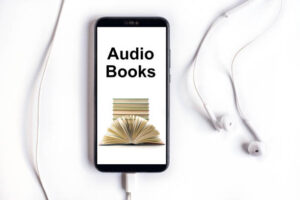
Modern publishing has provided new vehicles and careers to authors worldwide. No longer do a few publishing houses control the ebb and flow of work that is worth putting out there, and e-readers means everyone can have access to a library in their palm. Alongside traditional publishing, the market and ease of producing audiobooks have dramatically increased as well. The audio publishers association has reported several years in a row of double digit growth in audiobook listening. So how do you get a piece of this growing pie?
Below are some next steps to start with on the journey of publishing your audiobook.
Is audio right for your work?
This decision is individual to each author, and requires some careful thought. Although the audiobook market is huge, you must first consider the time created to make an audiobook. While it most likely won’t take as long to produce the audiobook version of your manuscript, there is definitely a time factor involved in the casting and production process. The less work that you, the author, are responsible for, the higher the monetary cost will be.
Also, you must be in a creative place where you can entrust your work to another. The narrator is an artist in their own right, who will blend their abilities and your work, to create a greater whole. This means that the sound in your head may not make it across to the work 100% accurately.
Additionally, the cost is an important thing to weigh, although it can vary a great deal depending on how you choose to create the work. A professional narrator is a good choice, but doesn’t come inexpensively. Lastly, are your stories something that would translate well to audio? And would your audience be interested in this new format for your work?
Create a budget.
There are many factors influencing how much an audiobook will cost you, but as a general rule, the more you do on your own the less it will cost. But unless you have significant audio recording and editing skills, not to mention lots of practice reading aloud, hiring a narrator is probably a good first choice.
Professional rates for narrators generally start at $225 per finished hour–meaning that if your book is 8 hours of audio, you’d multiply that number times the 8 hours. Many narrators these days are able to do or outsource much of the post production work themselves, but sometimes you may have to hire out to have proofers or editors for the audio. Look into these costs and be sure that you’re not going to get an unpleasant financial surprise at the end of the job.
Pick a platform.

There are quite a few to choose from, all of which have various structures and options as far as what royalties you get, and where and how they distribute.
- ACX- This is the big dog, owned by Amazon. Here you have several choices based on how you want to be paid, whether or not you want your title to only be distributed on Amazon, and whether you want to pay the narrator up front or in a split of the royalties.
- Findaway- Another good sized company with somewhat more flexible options. They’re less exclusive with their options in comparison with ACX. PLEASE NOTE: It was recently discovered that Findaway has allowed narrator voices to be used by Apple Books to train AI without the narrator’s consent. This is a developing story, and author’s should be aware that their narrator’s may be exploited when using this site. To read more about this story check out this article.
- Several other companies listed here. This link has some great pricing data on how much you the author will be paid and the distribution options not listed here.
Find a narrator (and why to think carefully about narrating yourself)
Many authors like to consider narrating their own work, and it’s easy to see why the idea might be very attractive. It’s your story after all, and who could tell it better than you? There’s truth to that, but you also have to consider the costs involved in doing so.
There’s recording space, since recording at your kitchen table won’t work. There’s serious time involved in doing the recording, because writing your book and reading it use two very different sets of skills, and there’s audio software and equipment that you will probably have to learn how to use. Unless you decide to pay for an outside studio and an engineer.
Finding a narrator usually involves putting up a notice for an audition and then choosing among the voices you get recordings of. It’s good to consider whether you want a male or a female voice, and if you’d prefer they do any type of an accent. It can be very helpful for your narrator’s to make note of unusual words/pronunciations that occur in your work. It’s also good to consider what elements of your story you need to have just the way they are, and what you may be okay with some interpretation of.
Once the narrator begins recording, the artistic effort is theirs, and it’s important to make sure that you’re okay with that step. Your chosen narrator will usually produce a short piece of audio (often called a first fifteen) to give you a chance to hear their work and their style, and once you approve, away they shall go.
Production time!

Depending on the length of your book, this can take anywhere from a couple weeks to a month or two. Make sure that both you and your narrator have a very clear understanding of expectations of turn around and what you’d like to be kept abreast of as they move through the recording. If you need to keep a close eye on things, be sure and let your narrator know so they are aware of your expectations.
Once the recording is done, the work will be edited and proofed, and then sent on to you. Editing will involve removing mistakes, duplicate sentences, noisy breaths, background noise, and whatever else may interject in the story. Proofing looks for read errors and differences between what you’ve written, and the narrator or their editor can insert corrected sentences into the audio.
Something to keep in mind with errors is that there may be places in the work where minor words can be omitted or altered for the sake of flow or understanding of the book. For example, if in the writing it describes a rough, angry tone of voice, the narrator can also provide that with their read, so all of the description may be a little redundant–but that type of choice is something you should discuss and consider what you’d be okay with.
Audio could be right for you!
Though there’s always lots to consider, and many options and paths to choose, adding audiobooks to the stable of your work can be an incredible boost to your profile as an author and be quite lucrative for your breadth of work. If you have the time and money available, it’s worth taking a good look at all the options and giving a go to the addition. A busy world means more people every day choosing to listen to a story on the go, and yours can easily be the next one that finds their ears.